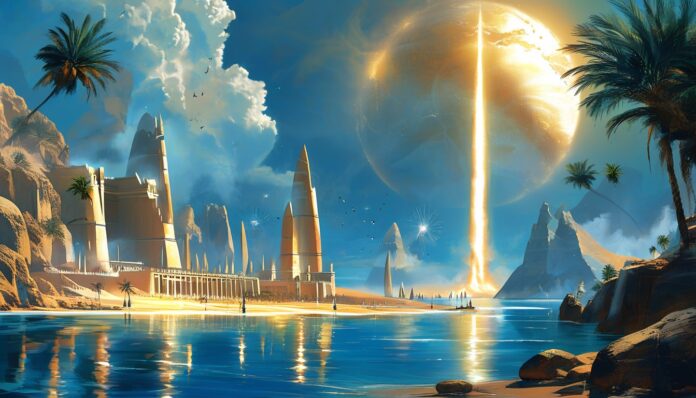An island of bliss, inhabited by demigods, a land that offers sweet fruits year-round, azure seas, and hot springs. This is how the beautiful mythical island-state of Atlantis is imagined.
The paradise island was created by the sea lord Poseidon specifically for his son Atlas, born of a mortal woman named Cleito. The other nine sons received only parts of one of the islands. Atlas was gifted the entire island and the surrounding sea, which was named the Atlantic Ocean in honor of his firstborn. Atlas and his descendants were meant to rule here forever.
The island truly flourished. The great minds of Atlantis employed the most advanced achievements. The hydraulic structures from that time still amaze modern engineers.
The island boasted an internal port and artificial canals. To supply the population with fresh water, a river was diverted. Bathhouses were built at the thermal springs.
Beautiful temples rose above the sea. The walls and gates of the temples, covered in gold and silver, still excite the imaginations of treasure hunters.
There are theories that the domes of the temples might have dispersed energy fields, enhancing the entire biosphere of the Earth.
The people of Atlantis were extraordinary as well. They were demigod-like beings, 3-4 meters tall, with massive chests. Their fingers were partially webbed, their feet had a special leaf-like shape, they had valve-like noses, and their skin was reddish-brown. Atlanteans had a lifespan of up to 600 years.
Brilliant architects, builders, traders, and warriors, the Atlanteans were also great fighters. Women fought alongside men. Each warrior possessed remarkable strength and agility, and expertly wielded weapons. It is believed that Atlanteans could thrive in water like amphibians. Additionally, they inherited from their ancestor Poseidon the gift of hypnosis, used in numerous battles to achieve victory after victory.
Atlantis was not just an island but an entire empire governed from the great island. It ruled over many territories, with conquests continuing and battles occurring one after another. According to legend, the Atlanteans’ excessive greed and cruelty provoked the wrath of Zeus and other gods, leading to Atlantis being submerged in the depths of the ocean in a single day.
A beautiful tale. But is it just a tale?
The existence of Atlantis is asserted as reality by the ancient Greek philosopher Plato in 429 BC, from whose writings we first learned about the island. Interest in Atlantis has never waned. Today, there are roughly equal numbers of supporters and detractors of Plato’s account.
Immediately after World War I, France established the “Society for the Study and Exploitation of Atlantis.” In the late 1950s, the field of “Atlantology” existed.
By gathering scientific research, we can outline the existence and demise of the great island.
Plato’s writings state that the island emerged from the Atlantic Ocean and was located near the Pillars of Hercules. It is believed that this place corresponds to the modern Gibraltar Strait, within the coast of Spain.
The civilization existed around 9500 BC, according to Plato, based on the accounts of the philosopher Solon. Solon was recognized as the greatest Greek sage. His reputation was impeccable, and his statements were never questioned.
What supports the existence of Atlantis?
Today’s scientific advances (ultra-precise and sensitive measuring instruments and sensors, the latest methods for determining the age and composition of archaeological finds) allow many hypotheses to be considered plausible events rather than myths.
- It is known that Atlantis perished due to an unprecedentedly powerful natural disaster. Soviet geophysicist A. Gorodnitsky recreated a model of this disaster. He believes it involved a rapid shift of the tectonic plate holding the African continent, colliding with the European plate. As a result, a powerful volcano erupted in the East, and in the West, volcanic islands sank into the ocean.
- Plato wrote that there was a route from the island to other islands, from which a continent surrounded by ocean was visible. The description of this continent resembles America. Until recently, this idea was dismissed, as ancient people were thought incapable of such voyages. However, in 1970, a well-known navigator completed an 87-day journey on a simple reed boat. This suggests that such crossings were possible for the Atlanteans.
- Modern archaeology has examples of technical achievements from around 30 BC that resemble those in Atlantis. For example, human-sized tunnels for collecting groundwater were found in Urartu.
- The technology for gilding temples with a mixture of unslaked lime and gold powder was revealed. Economical and very luxurious!
Or is it a myth?
In 1979, photographs surfaced showing structures on the ocean floor that resembled the walls of buildings. This renewed interest in the reality of Atlantis. The photos were taken by Russian researchers in the area of the “Pillars of Hercules.” In 1982, even higher quality photos appeared, showing entire squares, streets, and houses.
However, Russian scientists refuted the idea of these being man-made structures as early as 1984. It was possible to lift several slabs from the ocean floor and conduct mineralogical analyses. Scientists concluded that these “walls” were nothing more than solidified lava that had emerged through volcanic cracks.
Later, up until 2017, there were hypotheses that Atlantis might be on land where there was once a sea, suggesting locations in Spain and even the Sahara Desert.
Thus, humanity still lacks material evidence of Atlantis’s existence. The evidence, even if quite convincing, remains indirect. But people continue to believe in the reality of the beautiful utopian empire.
Based on this legend, hundreds of works of art have been created: books, films, paintings, and sculptures. Artists continue to draw inspiration from it, and audiences marvel at their creations. Perhaps it is not necessary to know whether Atlantis is truth or myth – the beautiful Atlantis?
